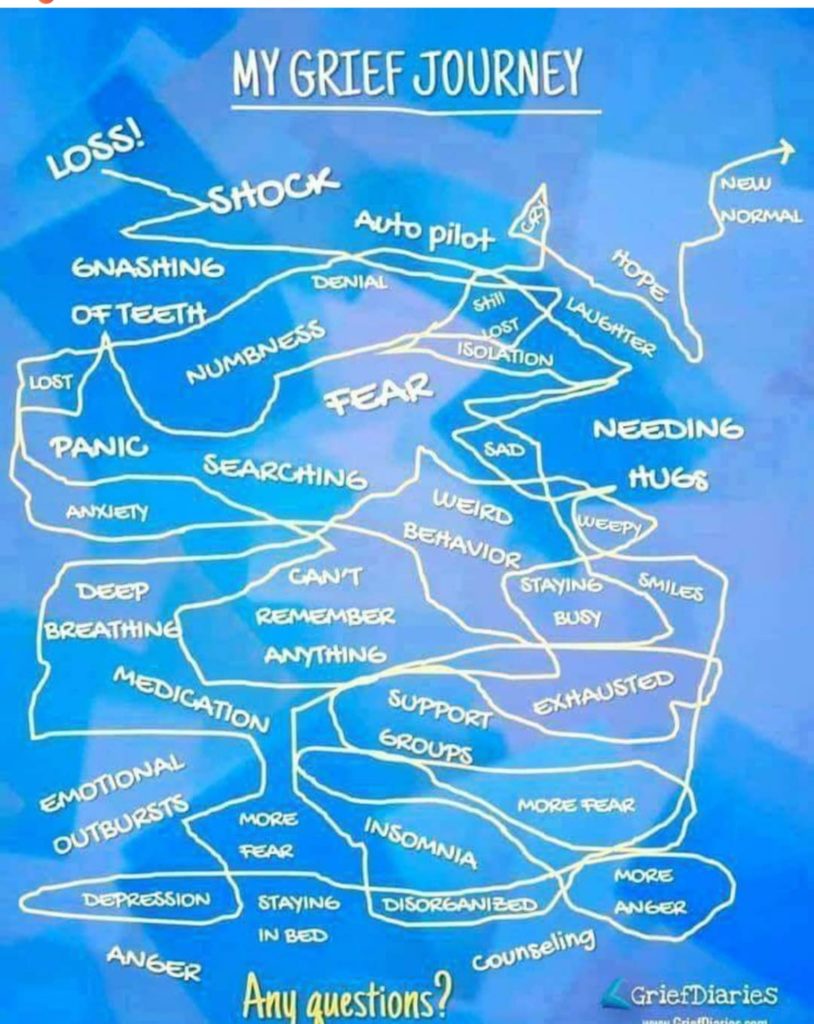Previous post
Now reading
5 Ways to Support Someone Who is Grieving
Next post


I wasn’t always grieving. In fact I used to be a person who tried to support others. Looking back I think I did this very badly though. In fact, I am appalled at the incredibly inappropriate things I said to these poor people, and the expectations I had of them. Yes…expectations! I actually expected them to come halfway so that I could feel OK too! Sheesh! 😫
So I guess my first tip is to NOT do what I used to do. 😁 When I became the grieving person myself it helped me to understand what it feels like to be on the ‘other side’, and I’d really like to go back and apologise profusely to all those poor grieving people who probably gritted their teeth through my clumsy ministrations. I feel that after having my life torn apart when my husband Norbert was killed means that I’m waaay better qualified now.
Read: The Day My Heart Broke
Big disclaimer here..this is my own list and every grieving person may have their own. It’s probably pretty accurate for anyone who has lost a soul-mate and life partner though. So…what are the 5 ways you can support someone better than I did?
By that I mean, give them the space they need to grieve, but stay close by. After Norbert was killed I was lucky enough to have friends and family who would send random texts and messages to ask what my plans were for the day, or to check that I was OK. This was a constant reminder that I wasn’t alone, and that people cared about me.
Losing a spouse is different that losing a parent/sibling/friend, in that everyday life changes dramatically, and just the silence of the empty house exacerbates the feeling of isolation and loneliness. Drop by, or phone, and ask how they are. Then, after they’ve said “I’m fine“, tell them that you would like to know the real answer—fine, terrible, a shrug or tears—and that this is perfectly OK and you’re here for them. I remember how good it felt not to have to pretend.
Back when I was completely naive I used to think that this would make a grieving person sad…but it’s the opposite! I absolutely love talking about my husband and anyone who will listen to me (better still, join in the conversation) are the people who have become my biggest supporters. The truth is that you want to keep this person close to you, and one way to do that is to talk about them. To be able to share their memory through conversation is so wonderful.

My happiest moments come when I’ve slipped in a reference to Norbert during a conversation, and the conversation continues but…in some way…. includes him.
Actually no…I tell a lie….the happiest moments are when I don’t need to initiate a conversation that includes him. It’s when somebody, in the middle of a conversation, turns to me and says “What would Norbert have thought about this?“

Most platitudes are born out of good intentions, and that was always the case when I used to utter them to those poor people in my past but when it was my turn to be on the other side I used to cringe when I heard phrases such as “my deepest condolences” (something that only belongs inside a Hallmark card), or “Everything happens for a reason” (no, there is NO good reason for my husband to die).
Another one “He’s gone to a better place” used to make me want to scream out loud “But I need him HERE!” All of these gloss over the pain and can be very isolating as instead of being comforting, I felt that they put up a wall between me and the person saying them. Please don’t wheel out the fake platitudes. If you can’t think of anything to say, say nothing. Just hug.
I vaguely remember the funeral and the numerous people who said “Let me know if there’s anything I can do” and “Don’t hesitate to call if you need anything.” I thanked them, but never called. The reality is that in the immediate aftermath of loss (especially traumatic/sudden loss) your brain is not working properly. I didn’t even know what I needed, let alone being able to think about who could help, and then call them. Impossible.
I must admit that in the past I used to say the same thing and I felt good about myself. Now I know it was just a way I could push the responsibility onto the grieving person. If they didn’t call me…well…I offered.

My suggestion is to be specific, but not pushy. I have a dear friend who said “If it’s OK with you I’ll be over for lunch tomorrow, and I’ll bring it…although a cup of tea would be nice.” In one fell swoop she provided company and a meal. I didn’t have to make any decisions but because I got to provide something, I wasn’t made to feel helpless.
I’ll be writing more about how you can actually help in a future post.
When it comes to grief, the initial shock and intense feelings of emotional pain are only the first chapter of the story.

The way people experience grief changes over time, but there’s no such thing as moving on, or getting over it. Years later, people may no longer say they are grieving, but they remain no less affected by the experience of losing a person they love.
I was the centre of attention immediately after my husband was killed (including TV cameras at my front door) but eighteen months later I probably only have a few real ongoing supporters. They still text me to check up on me and are genuinely interested in what I’m doing and how I’m managing.
I understand it can be a drag being with somebody who is probably not ever going to be the same person they were before the ‘happening’, but they still need support as grief is a roller-coaster and a bad day can happen at any time. Be there for them.

So….those are my 5 suggestions to support a grieving person. Can you add any more? Drop a comment in the Comments box below. I’d love to hear from you.
Marlene is an Australian widow who has written about all the good, bad and ugly stuff that happened after her husband Norbert died tragically. Marlene responds to all comments.
Helpful tips, Marlene. Thank you. You have shown there is no need to be afraid of the elephant in the room. See you for dinner tomorrow night!
Hi Marlene, thank you for your 5 helpful hints. These are a very useful guideline for someone trying to help a grieving friend.
I don’t think you need to blame yourself for not knowing these things in your previous life though. Your five hints are thoughts that can only come to you once you have been ripped through the fabric of life and are trying to stitch yourself back together.
The people you were trying to help may at some time realize that your heart was in the right place, you were at least trying to help. Sometimes just the fact that you cared enough to try can be an important factor in recovery.
I found at times that I became afraid other peoples fear of how to react to me and this was almost as bad as my grief.
People can be complicated.
Safe travels, and I hope you return home with a swag of beautiful memories to help embellish the life you have had so far, and yes, I am sure Norbert would agree.
Cheers, Ron.
Oh I have been so guilty of not following your hints, as I matured though I think I may be better at giving the love and support needed, and it varies with individuals as you know.
I commend you on your journey, Marlene and thank you for sharing. When tragedy hits, no one is prepared but these 5 steps make it easier.
8 Comments